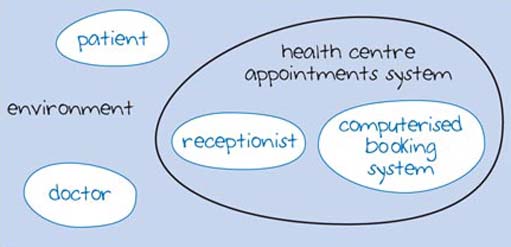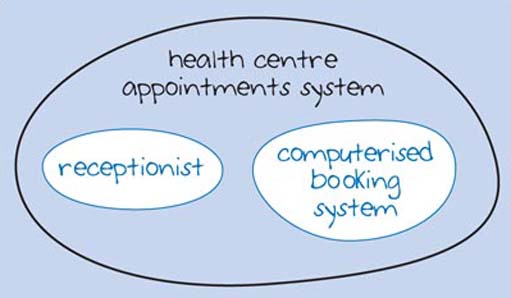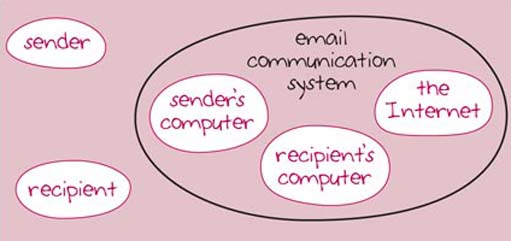2.2.2 Drawing the boundary
Deciding where to place the system boundary is an important consideration in that we have to think about what to include and exclude. This isn't always an easy decision to make and it often depends on the perspective of the person viewing the system.
The system maps in Figures 1 and 2 show the 'doctor', 'patient', 'receptionist' and 'computerised booking system' as part of the system. However, in Figure 3 the doctor and the patient are placed outside the system in an area that is called the system's environment; Figure 3 shows a perspective where the doctor and patient are not part of the system directly, although they influence it or are influenced by it. By placing them outside the system boundary, the focus is shifted towards the computerised booking system and how the receptionist uses it.

Figure 4 illustrates yet another view of the health centre appointments system. Here the doctor and patient are seen as irrelevant and so do not appear at all in the system map. This view of an appointments system embodies yet another shift in emphasis. It is a view that might be taken by engineers who are concerned with the hardware and software of a computerised system (these are discussed in more detail in sections 8–14). However, this view is too narrow, and therefore risky, when designing new systems or planning enhancements to existing ones. Ignoring some of the users of the system or 'stakeholders' could lead to a booking system that doesn't do the job it was intended to do.
Activity 2 (exploratory)
An email communication system includes:
-
the sender
-
the recipient
-
the sender's computer
-
the recipient's computer
-
the internet
Draw a system map to represent this email communication system (roughly oval outlines will be fine). Do you think the users (the sender and the recipient) should be inside the system boundary or outside it?
I've introduced system maps for two main reasons. Firstly, it is important to realise that systems are composed of subsystems and that these subsystems are often themselves composed of subsystems. This idea will help us as we explore ICT systems. Secondly, we may draw the system boundary in different places at different times. For example, if we want to discuss the social or economic impact of a particular ICT system, we will be drawing the boundary very widely indeed but if we want to look at how some subsystem in an ICT system works, then we will be drawing the boundary very tightly around the subsystem.


